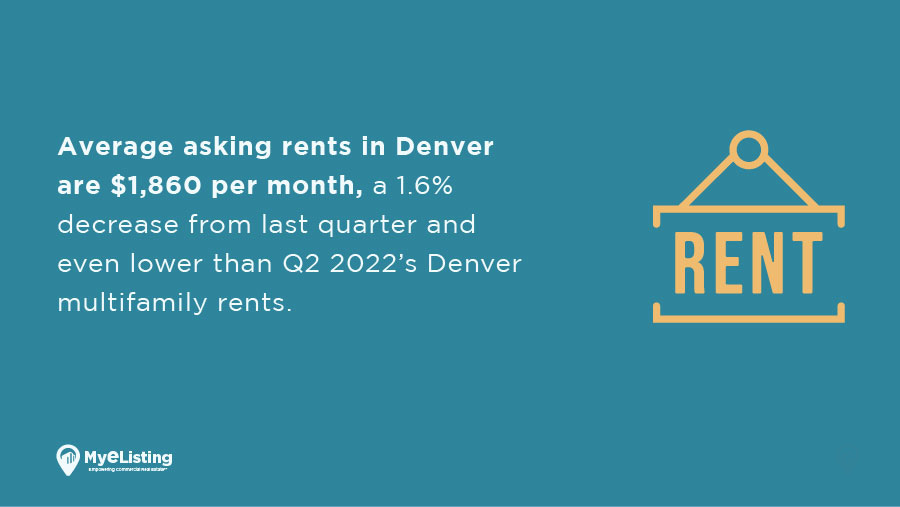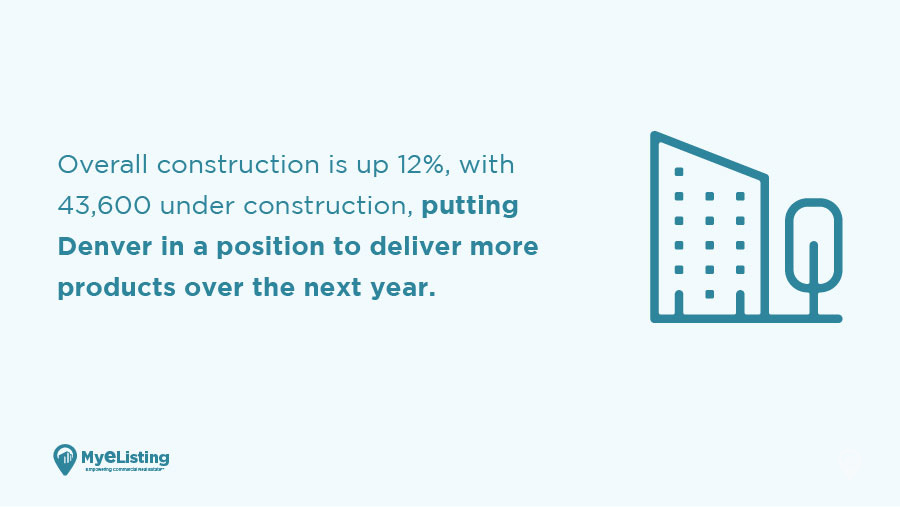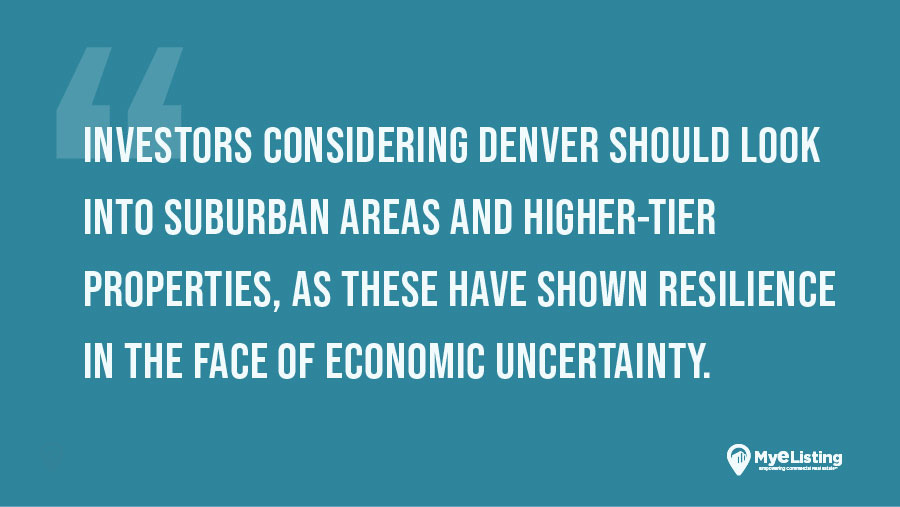Q4 2022 Multifamily Report: Denver, CO

Specializes in providing actionable insights into the commercial real estate space for investors, brokers, lessors, and lessees. He covers quarterly market data reports, investment strategies, how-to guides, and top-down perspectives on market movements.

Denver, Colorado saw positive employment trends in Q4 2022 despite a contracting multifamily market.
Total employment in Denver increased by nearly 4%, adding about 60,000 jobs, with professional and business services adding over 27,000 jobs, roughly half of the total.
An AI company, HNA live, is making its headquarters in Denver. This tech startup’s position in this increasingly popular industry will likely bring new jobs to the area.
Employment is expected to continue to increase another 1% into next year.
General Area Overview & Demographics
Denver, Colorado, is one of the most diverse cities in the United States. Its population is estimated to be approximately 716,492, with a median age of 33.7, according to the most recent census data from 2019. Of this population, about 48.4% are female, and 51.6% are male.
The racial makeup of Denver is quite diverse as well. White individuals account for approximately 57.2% of the population while Black individuals make up 10.8%, Asian individuals 5.1%, Hispanic or Latino individuals 30%, American Indian and Alaskan Native individuals 1%, Pacific Islanders 0.3%, and those identifying with two or more races at 3%.
The city is home to many prestigious universities and colleges, offering students a wide range of programs and degrees worldwide. The University of Colorado Denver is one of the city’s largest and most popular universities, boasting more than 17,000 students.
During the winter, snowfall can be frequent, and temperatures are below freezing. Spring can bring a mix of rain and snow. Summers are typically dry and sunny, with average temperatures reaching the high 80s. Fall is also mild, with temperatures between 40-60 degrees Fahrenheit.
Summary of Denver Multifamily Real Estate Performance in Q4 2022
As new properties came online, vacancy increased in Q4 2022 to 5.5%. Absorption additionally dipped in the negative.
Boulder South’s submarket had the lowest vacancy at 2.9%, while Denver’s CBD posted a 7% vacancy.
Vacancies are being seen primarily in Class B and C units as Class A rates have held over the year at around 6.1%.
With more properties making their way into Denver’s multifamily market, the vacancy rate is expected to rise further in 2023.
What are multifamily rents like in Columbus?

Average asking rents in Denver are $1,860 per month, a 1.6% decrease from last quarter and even lower than Q2 2022’s Denver multifamily rents. This decrease comes after rents steadily increased throughout H1 2022 by about 8%.
Class A units saw the highest increase in cost, now up to $2,920 per month.
Following Q4 2022, rents are expected to continue upward, with the average asking rent increasing to $1,900 per month by the end of 2023.
Purchase & Leasing Activity
Sales activity for Denver multifamily was down this quarter.
Quarter-over-quarter, there was a 40% decrease in the number of deals. Sales volume was also down about 30% year-over-year.
The average price per unit has decreased 12% down to $300,000, while average cap rates are at about 4.4%
Notable Denver Multifamily Real Estate Deals in Q4 2022
There were several deals for Denver multifamily properties
- Heights at Interlocken sold for $142.5 million at $415,452 per unit;
- Lyra sold for $115 million at $378,289 per unit; and
- The Link at Cherry Creek sold for $50 million at $208,542.
These are select examples among other sales and leasing activities.
New Multifamily Real Estate Development Activity in Denver in Q4 2022

Over 3,500 were completed in Q4 2022, bringing the year’s total to 11,000 units.
Overall construction is up 12%, with 43,600 under construction, putting Denver in a position to deliver more products over the next year.
About 13,000 permits were pulled this year, with only 2,300 pulled in Q4 2022. This was 40% lower than the number pulled in Q3 2022.
Market Forecast for Denver Multifamily Real Estate Market
Multifamily property performance has weakened, with rising development and declining renter demand in the fourth quarter leading to a dramatic decrease from last year’s net absorption rate.
However, these metrics are anticipated to level out by late 2022, reverting closer to numbers seen in 2016 and 2017.
Denver’s multifamily real estate market is forecast to experience sluggish job growth and slower lease-up rates for the near future, with a rising vacancy rate due to an influx of new units.
Investment sales activity should remain steady for now before increasing again by 2023, creating chances for investors looking at potential opportunities.
Takeaways for Multifamily Real Estate Investors

After over a year of impressive growth, Denver is experiencing a slight contraction.
While it can look like things are down, this is following significant strides of growth, and we see Denver as one of the lowest-risk cities for CRE investment in 2023.
Investors considering Denver should look into suburban areas and higher-tier properties, as these have shown resilience in the face of economic uncertainty.
Do your research, stay vigilant, and happy investing.
Find & Connect With Commercial Real Estate Agents & Brokers in Denver, CO for Free on MyEListing.com
Don’t go your multifamily investment journey alone. Find & connect with commercial real estate agents & brokers in Denver, CO for free on MyEListing.com
Article Search
Share
All Article Categories








